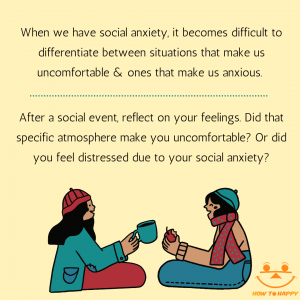
Social anxiety can impact a lot of areas of our lives. It doesn’t just affect us socially, but also professionally and personally. Some signs of social anxiety according to Better Help are avoidance of particular actions in public or the social event altogether, expecting the worst when in public, and an overall sense of fear and worry. We all may experience some of these things every now and then, but when it starts to hold us back from being successful and pursuing our goals, it becomes a problem. Here are three tips that can help you cope with your social anxiety and prevent it from controlling your life.
Start Small
The best thing to do when dealing with social anxiety is to just put yourself out there. This may sound scary, but hiding will do you no good. A lot of times, the fear of the unknown just makes our anxiety even worse and we need to start familiarizing ourselves with certain social situations. You don’t need to go to huge parties or gatherings straight away, in fact, it’s better to start small so you don’t overwhelm yourself.
For example, you could invite a friend or two out for a cup of coffee. Having fewer people around and also going out to do something quick like drink a cup of coffee is a great warmup. Do this a few more times until you’re completely comfortable with that situation, then, move on to another. Accept an invitation to dinner, for example, then accept an invitation to a birthday party. Take it little by little and create weekly or monthly social goals. The important thing is that you are making yourself uncomfortable at first, and then moving on once you start to get used to a particular setting.
Differentiate Between Anxiety & Discomfort
It’s natural to feel distressed during events when dealing with social anxiety. However, that often creates confusion between what is our social anxiety and what is actually us being uncomfortable. This can be really tricky because the goal is to beat our social anxiety by making ourselves uncomfortable. But the goal isn’t to force ourselves to become comfortable with things that just aren’t for us.
For example, if lots of drinking makes you uncomfortable and you’re at a gathering where everyone is heavily drinking, you don’t have to force yourself to stay. However, if it’s the number of people that’s making you uncomfortable then try to push through it. You don’t want to give yourself an anxiety attack so it’s absolutely alright to get to a quiet place until you feel better. But do try to challenge yourself as much as you’re able to.
Always reflect after social events to determine whether your anxiety may have gotten the best of you, or if something caused you discomfort. Ask yourself questions like: Did something happen that made me uncomfortable? Did it go against my values? Was that event overwhelming or was it not appropriate for me? All this can help you determine where and how to challenge your social anxiety next.
Don’t Be a Spectator
Simply making it to anything social is a major accomplishment, however, we don’t want to be observers. It’s so easy to allow ourselves to watch everyone and not actually interact or socialize. We don’t have to go around introducing ourselves to everyone, but we should attempt to at least have a conversation here and there. That’s part of the challenge.
If you’re at a birthday party, for example, rather than watching people play, go participate in as many birthday games as you can. It doesn’t have to be anything major. A simple “hi” could be enough at first if you’re the type of person who never speaks to anyone. You could even go up and compliment someone. There are also others who may be just as anxious as you are so go find them. Starting up a conversation with them can help you feel less alone. Whatever it is, make sure you don’t stand around watching everything and letting your anxious thoughts get to you. Getting involved will make the experience a lot more pleasant.
Practice Makes Perfect
Believe it or not, just like with anything else in life, the more you practice being social, the better you’ll get at it. It can be extremely frustrating at first, especially if you feel like your progress is too slow. But any progress is great no matter how small. Just start and put yourself out there. Focus on one step at a time and don’t overwhelm yourself, but also face your fears.
Exercise:
1- Create a weekly/ monthly goal plan. How will you challenge your social anxiety?
2-Reflect after social events. Did something happen that made you uncomfortable? Was that event not appropriate for you or did your anxiety get the best of you?
3-Whenever you’re at a social event, don’t just observe. Start a conversation with someone or participate in something.

